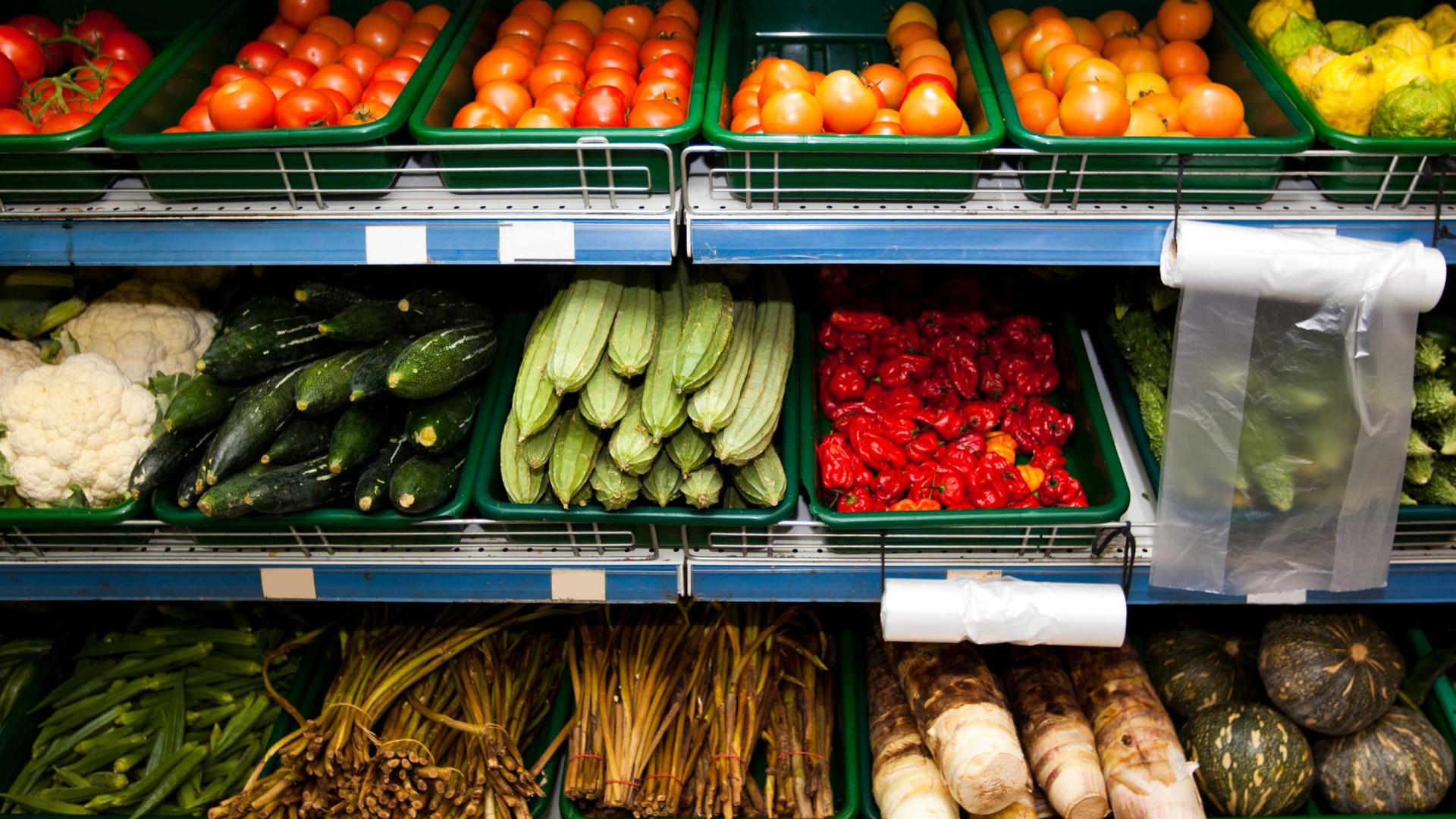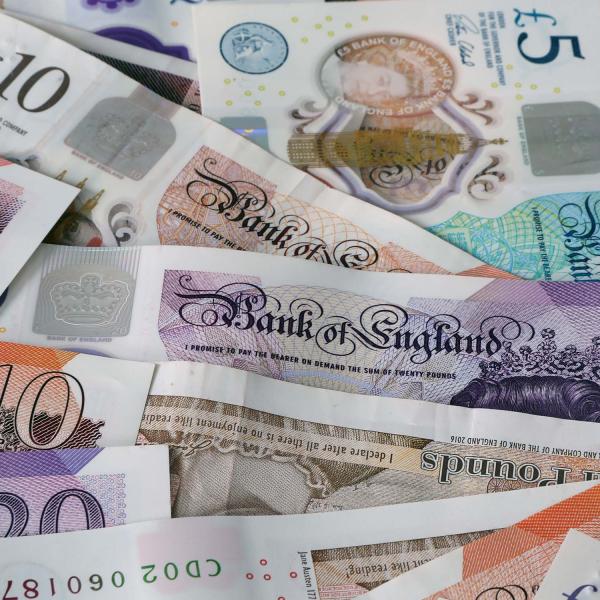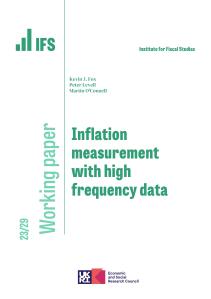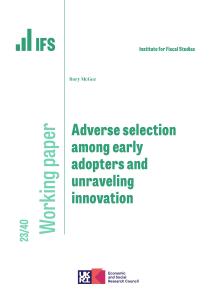
Inflation continues to affect the UK economy - we speak to two experts on inflation who explain the bigger picture.
Chris Giles
If everyone is trying to defend themselves and inflation becomes the thing that they think about all the time - companies and households - households want to make sure they defend their incomes, companies want to make sure they make enough money still and defend their profit margins, or try it on a bit, and you get into a spiral, so it turns into a vicious circle.
Paul Johnson
Hello and welcome to this edition of the IFS Zooms In. I'm Paul Johnson, I'm director of the Institute for Fiscal Studies, and today we're going to be talking about inflation: what's wrong with it, and maybe even a little bit about what it is and how you measure it. And to help me answer those questions I'm joined by Chris Giles, economics editor at the Financial Times and, a long time ago, a former colleague at the IFS. And Peter Levell, who is currently an associate director at the IFS and an expert on inflation.
Chris, let's start with the basics: what is inflation, and why do we worry about it so much?
Chris Giles
Inflation, to use the textbook answer, is a general rise in the level of prices, and so that doesn't mean that the price of milk goes up but the price of butter goes down, it's that all prices will go up by a certain amount, and that's what you're measuring the general level of prices. There's a target in the UK, and most other countries similar to the UK have a target of about 2% for the level of inflation. Why is it not 0? Why do we talk of 2% inflation being price stability, not 0 inflation, prices staying the same? And that's really just to allow, to grease the wheels of the economy a bit, to allow some prices to rise and other prices - not necessarily to fall, but to stay the same, and having some prices go up relative to other prices which we think is a good thing, because some things are more in demand and other things are less in demand or that you might have more productivity in certain areas. So, we've seen the price of electronic goods collapse in the last 30 years, and that's a really good thing because we are richer, our incomes stretch further, we can buy more of them, and other things like domestic services, prices have often risen faster than the overall level of inflation. And you need that relative adjustment, and that's why it's thought to be slightly easier to do that at a level just above 0 than 0.
Paul Johnson
This is not a big issue for us today, but it's something that people worried about quite a lot not very many years ago at all. People were actually quite worried that we might end up with negative inflation at certain points over the last decade, prices actually falling. Right now that sounds like a wonderful thing. Why were people actually really quite worried about prices falling?
Chris Giles
Well, if you have prices falling, generally it goes with incomes falling as well, and so prices falling and incomes staying the same - basically fine: if everyone is better off, you can buy more stuff. But if you have incomes falling and then you have debts which don't fall, then you find it harder to pay your debts, and so the real problem of negative inflation or deflation, as economists like to say, is a thing called debt deflation, where debts get bigger, harder to pay. What you are producing means it's harder to get around paying off the debts that have accumulated over the past and then that can end up in defaults and horrible things happening.
Paul Johnson
Yeah, if your income is going down and your debt and your mortgage or whatever is the same in nominal terms, then you're going to really struggle. And actually, we've seen the reverse of that at various times: early on in my lifetime, high levels of inflation during the 1970s meant that people who took out what looked like big mortgages in 1970 had piddling mortgages by the time they got to 1980, so that you can talk about almost the opposite effect there.
Chris Giles
And we've seen in the past year, so we've had high inflation all around the world and in the latest International Monetary Fund Fiscal Monitor, they did a little box on how much this high inflation has lowered the debt levels of countries. And so, countries which have very high levels of debt - Greece, for example - went down by about 20 percentage points in GDP.
Paul Johnson
Wow!
Chris Giles
And so, you had some really big effects, and that was because it was unexpected, so the people who Greece owed the money to, hadn't got round to saying, 'actually we want a higher interest rate because all of this inflation'. Because it came unexpected, you had one-off very big gains in a lot of southern Europe, so some of the debt ratios in those countries have come down quite a bit. Not here because our debt is much more linked to inflation than most other countries. That's because we thought we had a bad inflation problem particularly in the 1970s, and we wanted to show the rest of the world in the 1980s that we had got over this hump of having, being the sick man of Europe, the country with the worst inflation, and one way to do that is to try and get more credibility into your policy, to say, 'we are going to get rid of that inflation', and one way of doing that is to issue quite a lot of debt, which is linked to inflation. And if you link that to inflation, that means that you as a government have a lot of downside if you actually generate inflation, and it's a way of having credibility. Also, our pension funds and our pension industry in this country also likes index-linked gilts because a lot of its liabilities are linked to inflation as well, so it matches their assets and their liabilities. But that's why the UK has traditionally had - and we've gotten far more than any other advanced economy - so our debt levels this year have been far more sensitive to the inflation that all countries have experienced than any other advanced economy.
Paul Johnson
And it's one of our problems going forward is that we're paying quite a lot of interest on our outstanding debt over the next few years. So we've got lots of taxes going up, but with that tax going up, we haven't actually got that much extra to spend because we're, part, one - for lots of reasons - one of the reasons is that we're spending so much on debt interest.
Peter, we've talked a lot about the sort of macro issues around inflation. One of the things that people often say is that the other thing that inflation does is slightly randomly redistribute between people: some people win, some people lose as a result of inflation. It's not deliberate, and that's actually can end up being very unfair.
Peter Levell
Yes, and that's a big issue with the inflation at the moment is it was unexpected and it's volatile and, as Chris said before, this has distributional effects, so it redistributes from people who had high debts, who are going to benefit from higher rates of inflation, and away from savers whose savings might be fixed in nominal terms, in cash terms, and see the real value of their savings fall as inflation rises. It's going to have effects on the tax system because not all of our taxes and benefits rise each year in line with inflation in the way that arguably they should, and that means that some people end up paying more tax than they would otherwise, and other people being less taxed than they would otherwise. And these kinds of arbitrary redistributions, it creates unpredictability and it's not particularly fair, no one planned things to go this way, no one expected things to go this way, and it's an arbitrary consequence of inflation.
Paul Johnson
To some extent government's been quite pleased about this. So, one of the ways they've raised taxes is to keep the point at which you start to pay income tax fixed, and that's raising an awful lot more money than they expected because prices have gone up an awful lot more than they expected.
Peter Levell
Yes, that's right, exactly. One of the largest tax increases in the last Budget was not increasing some of the allowances in line with inflation, netting the government, as you said, a large amount of money.
Paul Johnson
And that's a wonderful way to raise taxes in a way that's essentially hidden from most people. So, we're not increasing the rate of income tax, and we're not actually changing any of the parameters in income tax, we're changing the cash-terms point at which you start to pay income tax, we're dragging more and more people into paying it, and a bigger fraction of our income is being taken in tax over time, which as I say the government would be very happy about, but rather randomly takes money away from people. The way that was, actually when these measures, these freezing of allowances and thresholds were first introduced, this level of inflation wasn't expected, these turned out to be much bigger tax rises than were originally intended.
I want briefly to talk to both of you again about what this inflation thing is and how it's measured. And we hear about this occasionally. We've heard that junior doctors, for example, say that their pay has fallen by 35% in real terms over the last decade or so. But in doing that they're not using the measure of inflation that we tend to use, they're using a measure called the Retail Prices Index, which many listeners may be familiar with because it's the longest-standing one, but the measure used by the Bank of England is something called the Consumer Prices Index, the CPI, and actually the ONS has a third measure, the Office of National Statistics, that it prefers, the CPIH, which is the consumer prices index including housing costs. So that's all terribly confusing, we've got three headline measures of inflation and lots of claims made about each of them. Chris, perhaps you could just start by untangling those three things that I just mentioned, CPIH and RPI?
Chris Giles
So, the RPI, the retail price index, is the index such as, which, its only use in the UK is – well in terms of its academic use – is it's very long standing, so it has a long history. It is used a lot, particularly for indexing government bonds, so the index-linked government bonds - and that's a market of about £500 billion, so a lot of money I think we can safely say - it goes up with the RPI index every year. But it has some severe problems which got a lot worse in 2011, which is that part of the index, and this is where it all gets – you don't really want to know some of this stuff.
Paul Johnson
No, we probably don't, just tell the listeners that it's wrong.
Chris Giles
Yeah, it's too high, and it's too high particularly because when prices bump up and down, if you measure things where prices going up and down it puts an upward bias into it. The maths is all very clear, everyone understands it who wants to understand it.
Paul Johnson
Which is about three people.
Chris Giles
Which is about nobody.
Paul Johnson
Peter’s smiling because he's certainly one of those people.
Chris Giles
And it got worse because of the way the ONS changed the way it measured clothing prices, which made more bumpiness in the way that clothes were measured. And then, so it's about 1 to 2 percentage points higher than the consumer price index, and even more than currently the consumer price index with housing costs. And the with housing bit, just to help listeners know the CPI versus CPIH, they're basically the same index, they're calculated in the same way, but the CPIH takes account of owner-occupied housing, because obviously if you own your own home with a mortgage, you do have to pay for the housing services. So, what are housing services? So, things like your location, your shelter from the rain and the elements, and the amenities of your house, those are the sorts of things you get. And the ONS have decided that they will try and measure those things, saying if you rent a house you're also buying the same sort of stuff, so we can proxy those things, which you don't pay any money up front or out of your pocket for, by what's happening to rents, and rents aren't going up as fast in price as the other goods and services in the inflation basket.
Paul Johnson
So, the RPI, the old one, is higher than the CPI, the Bank of England headline one, which is higher than CPIH, which is the one that the ONS prefers, though hardly anyone actually uses.
Chris Giles
No one.
Paul Johnson
We could delve into this for hours and hours. Hopefully listeners at least gathered that measuring this stuff is incredibly hard, and we've only just touched the very tip of the top of the surface of some of the complexities involved in measuring inflation. I mean, just imagine that you have to, all the millions of goods and services that we consume in the economy, and every month the ONS has to come up with one number to say how much those prices have increased, and that is something I'm sure that those of us sitting around this table will continue to think and argue about for many years to come.
But let's get back into the sort of the everyday real economy. Inflation at the moment is somewhere around 10%, so I mean five times higher than the Bank of England's target of 2%, and this is really for, for many people a completely new experience - I think this is the highest it's been since sometime in the late 1970s. Chris, is this all just Ukraine? Would we be down at 2% if Russia hadn't invaded Ukraine, or is this a rather more complicated story as to why the number is so big today?
Chris Giles
That's the big argument around the world. So, you know, there is a lot of Ukraine in there, but it's not only Ukraine. Why are we at what 10.1% on the CPI in March? Which again it's the early 1980s, about 82-ish, I think is the last time, but highest in 40 years, and that again is pretty much where most countries are, highest-in-40-year territory. Now, so it's particularly high in the UK, so we're at the moment higher than the US and the eurozone, not higher than every country in the eurozone, because the UK consumes a lot of natural gas. So, Ukraine is really important for natural gas prices because that affects both our heating costs, which we are a cold country, we heat our homes, we spend a lot of money on heating our homes in the winter, but we also generate a lot of our electricity - about 40% - from natural gas, whereas France generates about 75% of its electricity from nuclear power for example. And that explains a lot of the difference.
Countries that are closer to the eurozone and also who have more food in their inflation baskets, who are poorer, so people spend more money on food, so the Baltic states, Lithuania, Latvia, Estonia, Hungary, Czech Republic all have even higher inflation rates because they both also use a lot of gas and use a lot of food and those are the items that have gone up most in price. So, the key reason why inflation has got so high is food prices and energy prices. But that has then morphed into other goods. So, you now about 75% of the items in the UK's inflation basket are rising at more than 5%, so more than double the Bank of England’s target, and part of that is indirect cost of energy, so your restaurant has to use gas and electricity to cook the food, and it also uses food ingredients in there.
But it's also because we are seeing now what is a really unhelpful term that economists use, second-round effects. So, we're seeing, because inflation's been so high, everyone in the country thinks oh, I need to try and defend myself against this inflation, I want a higher wage increase, and will ask for higher wage increases, lots of employers will give it to them. But then employers go oh, my wage bill's gone up quite a lot, I think I need to raise my prices. Or my electricity bill's gone up, I'll raise my prices. Or everyone can see that prices are going up, I’ll try it on, haven't been able to do this in the last 20 or 30 years, people would have just been outraged, but now all prices are going up, I'll see if I can get away with it. And so, you're seeing this move into what the Bank for International Settlements, which is the Central Bankers Bank in Basel, they call like a high-inflation environment.
And the trouble is you can get stuck in it, so if everyone is trying to defend themselves and inflation becomes the thing that they think about all the time, companies and households, households want to make sure they defend their incomes, companies want to make sure they make enough money still and defend their profit margins, or try it on a bit, and you get into a spiral. So, it turns into a vicious circle. And that is, there is some element of that because wages are rising fast, corporate margins in lots of countries have gone up, we don't know how durable that is, and so that is the big concern, and that is what central banks are most worried about, is that movement from just a surge in energy food prices, all to do with Ukraine, or external things you could do nothing about that, that just was something that afflicted us and we just have to suck that up. And then the inflation that begins to become self-fulfilling and you've got to drive that out of the system.
Paul Johnson
That's not terribly cheery. Before we go on to the future, you've talked about food prices, you've talked about energy prices, you’ve talked about Ukraine, you talked about the sort of second-round impacts of that. Did COVID play any role in this? Did the hundreds of billions that western economies chucked at their economies play a role as well? Or was that sort of not really relevant to this?
Chris Giles
No, I think it is relevant, it's relevant to different degrees in different countries. The place that it’s most relevant to is the US by a long way. Because - I'm going to just generalise here - in Europe, what countries did mostly, a little bit like what the UK did with furlough, that you would be paid to not work for a period, but you'd be attached to your company. In the US, they had a different approach, which was to say well, let your firm lay you off, and we're going to stuff you with loads of money, lots and lots of money, so lots of people were better off in COVID than they were when they were working. And then when COVID goes away, your company can rehire you if they want or can take a different choice. And there was a lot of argument during COVID, which was the better type of policy to do. As it turns out, the US way of doing things, because they really spent so much, such large cheques were sent to households that actual demand was very strong, and particularly demand for goods because you couldn't pay for consumer-facing services like restaurants or going out to the cinema because they were shut, so it was demand for goods went through the roof, particularly in 2021, and that then hit global supply chain problems because it was harder to produce things, but actually demand was higher than normal, so there was just a lot of demand for goods, and then the price went up globally. Shipping companies found it more difficult, there were lots of difficulties about getting goods to flow around the world, but that was mostly a US thing. In Europe, it was mostly an energy and food price thing, which actually in some ways makes us all much poorer because it's these necessities that have gone up by a very large amount, which we have to spend the money on, and our incomes haven't gone up so much, making us poorer. And this is where Huw Pill, the Bank of England’s chief economist, has got into all sorts of difficulty last week by just sounding insensitive. What he was saying was entirely correct that if the necessities you buy go up a lot in price and they're imported, you as a nation and all the people in that nation are worse off, and then there's a distribution about who's going to be actually worse off and who might be spared, that's what he was trying to say. But he said – he basically made it sound as if you need to stop trying to make my job in the Bank of England more difficult, you horrible people – and it made people very cross because it's in the end, that is not the Bank of England’s job to be telling people how to behave.
Paul Johnson
Yeah, it's in a sense, I’m afraid, it is rather commonplace among us economists talking together, we have been saying for a while, this thing just has made us all worse off, that the price of, as you say, food and energy is gone up, we're importers of these things, we as a country have become worse off, and overall we as individuals, perhaps not all of us, but on average, we as individuals are going to be worse off as a result of that for some, for some period of time.
Peter, that's not affecting us all the same, though. You've looked quite a lot at the extent to which the current bout of inflation that we're suffering is affecting some people more than others. Whilst Huw Pill was correct, we're worse off overall, it's also the case that some of us are not doing quite so badly, but others are doing really much worse than the average.
Peter Levell
Yes. So, when we talk about headline figures for things like the CPI, what we're measuring is an average, it's the increase in prices as they would affect the average household and, of course, households differ from the average, some might be spending more of their budgets on energy, some might be spending more of their budgets on food than other households, and they’re going to naturally be hit harder by price increases, which, as Chris says, are predominantly affecting energy and food prices. And the unfortunate thing is that it tends to be those on lower incomes that spend more of their budgets on energy, more of their budgets on food, and what we've been able to do at the IFS is to use survey data on how people spend their money to compute new inflation rates that are specific to different income groups. And we see that the average inflation rate is about 10%, but for those on the lowest incomes it's closer to 14/15%.
Paul Johnson
For low-income people, they're not facing inflation of 10%, which is bad enough, they're facing inflation of up to 15% because they spend a large fraction on food and energy.
Peter Levell
Yes. And they're about three times more exposed to energy and food prices increases as richer households. So, inflation has these distributional consequences that are masked when you just look at these kinds of average numbers, high though they are.
Paul Johnson
Going back to our original discussion, what's wrong with inflation at the moment? It's just redistributing away from poor people?
Chris Giles
Or arbitrarily, if you happen to be housed at a cold Victorian house which needs a lot of energy to keep it warm.
Paul Johnson
Chris, by the way, lives in one of these houses!
Chris Giles
You are going to be cold and poor, if you happen to be housed, and talking about social housing, if you happen to be housed in a modern, well-insulated flat, then you might well be better off because the compensation you've received - again an average number across the country - for higher energy bills might have been more than the extra you had to pay. It's arbitrary, and that's why people hate it so much.
Paul Johnson
No, absolutely. And why we may have quite a lot more pain to go through to, as you put it, squeeze it out of the system. Interest rates have already gone up a lot though there's still - one of the things people talk about is interest rates kind of at new high levels, but of course they're way below what actually inflation is, so in the sense the real interest rate is still very negative. Do you think interest rates have got a long way to go up? Or are we stopping here?
Chris Giles
We mostly think that interest rates will certainly, almost certainly go up on the 11th of May to 4.5%, that's pretty much baked in as far as the financial expectations are concerned. Financial markets think they might go up further than that to close to 5% by the end of the year, a lot of more the economists who study this on a day-to-day basis think that's probably a bit too far. The Bank of England has already said it's not minded to put interest rates up, it'll only do so if it sees the inflation problem lasting. And I think that real interest rate number you just said, saying they're still lower than inflation so it's still in that sense a negative, that's true for current, but that’s a backward-looking number, it's not a forward-looking number. So, if we're expecting interest rates to be 4.5% and having inflation coming down by the end of the year - it is going to come down because of all of the energy price rises from last year are going to fall out of the 12-month comparison, that doesn't mean prices have come down, it means inflation comes down later this year, then you probably will start having positive real interest rates. So, the prospective real interest rate is now much higher than it was. So, we do think these interest rates are restrictive, if you've got a mortgage coming off a two- or five-year fix, you are certainly going to be noticing the difference. Another arbitrary thing, if you were two years ago thought I'll get a two-year fix, that wasn't a dumb decision, but it will feel pretty stupid now, pretty unfair. But just because you are one of the people who are going to take a lot of pain for what the Bank of England is trying to do, is trying to generate an average amount of pain across the country to the lower demand, lower spending, make it harder, make people think twice about raising prices. Make a company think, if I raise my prices now, maybe people won't buy the goods, and then maybe that will actually hurt me more than sticking with them where they are, and the same for wage demands. That's the purpose of higher interest rates, it's to both make people think twice about raising wages and prices, and also make saving again, not spending, more attractive than spending and borrowing.
Paul Johnson
Yeah. And this impact on mortgage payments is really big. Some work we did here suggests that, on average, people under the age of something like 40, I think, this is effectively a, it will be a 10% cut to their income.
Peter Levell
Yes, I think yes, so for younger households with mortgages, the effect of that increase in interest costs on average is basically equivalent to the inflation of non-housing items, so it's like being hit twice, once by the increase in prices, once by the increase to interest rates.
Paul Johnson
So even if wages go up 10% to compensate for the rest of inflation, your overall income, your disposable income is still down by that 10% because of its impact on your mortgage payments. So that's a real hit for younger people who have recently bought a house.
Chris Giles
It's really interesting. One of the things that we used to think about the damage of inflation in the 60s and 70s was it hit older people, because often they had flat-rate pensions, and they didn't go, they had no indexation in their pensions. And so, the feeling was that inflation was really bad for old people and really good for young people because, often because they had their mortgages whittled away by that, and their incomes are rising faster than inflation, even when inflation was high, and that's completely turned around now. So older people have, if you're a pensioner, much more of your income is going to be index-linked, so your state pensions are going to be index-linked, and it’s young people who are really suffering. And so that's a real change in society - who's hurt by inflation - which I think is quite an interesting thing.
Peter Johnson
I suppose the real mortgage, if you do have a big debt, the real value of that is going to be whittled away by this, so there's a short-term hit.
Chris Giles
Less so than in the 70s, because incomes are rising lower than inflation and they were rising faster than inflation then. So even though you had very high interest rates in the 70s, the growth of your income, on average, was faster whereas now it isn't.
Paul Johnson
I was just being hopeful there, having bought a house and took out a mortgage about a year ago.
Chris Giles
You have to tell the trustees and demand more money, and then they'll give you a lecture about second-round effects!
Paul Johnson
Yes, and about how foolish I was buying a house a year ago. So, let's finish off. You've already gazed into your crystal ball a little bit, Chris, in terms of, you know, thinking about inflation coming down. And it sounded like you were pretty confident that the Prime Minister would have his wish, which is that inflation would be half at the end of the year what it was at the start of the year, though no thanks to anything he's going to do, that's simply part of the job of the Bank of England, partly the result of energy prices at least no longer increasing. But the OBR, the Office for Budget Responsibility, was even more optimistic, I think they thought that inflation would be something like 2 or 3% by the end of the year. What's your sense of where we'll be, and are we on course to squeeze it out and get to the Bank of England's 2% rate within a couple of years? Or are these second-round effects piling up so that we're stuck in a high-inflation equilibrium?
Chris Giles
That's the really difficult question.
Paul Johnson
That’s why I asked.
Chris Giles
What you can say, I'll tell you what you can say and what you, and what we know and what we don't know. Inflation is going to come down, it's going to come down really quite fast this year because the energy price rises in particular are going to fall out of the 12-month comparison, so, in the next set of inflation figures, which are for April, we're going to see a large fall because there were very large rises last year. Also, in the October numbers coming out in November, the same will be the case. We should also expect food prices to stop rising and begin to fall soon because global food prices peaked in the summer of last year, and there's a lag before that goes into retail food prices, and so that should be coming through.
What we don't know - so, inflation’s going to come down, and pretty much everybody thinks it's going to be half, at least 5 by the end of the year, so Rishi Sunak will meet his pledge again, though not because of anything he's done. What is unknown and difficult at the moment is, does it stick a bit too high? That is where every, all the economists and the Bank of England will be looking very closely at what's happening to wages, and also what's happening to corporate margins, what's happening to really quite salient items that people notice like food prices, that's why one of the reasons food is so important, it’s not only a big part of what people spend, but it's also something people notice, and they notice it in the shops. And so, if you keep seeing prices going up, you're more likely to try and defend your own incomes. And so, where the Bank of England is concerned, and I think it's really quite noticeable in the way they model inflation, because their model doesn't have any second-round effect in it, they assume that they're credible and inflation just comes back to target.
Paul Johnson
Their model has no second-round effects?
Chris Giles
No, it has no second-round effects.
Paul Johnson
I didn't know that, and I'm horrified.
Chris Giles
And they're pretty horrified as well, so what they do is they have a central forecast which comes out of the model, it’s called their modal forecast, but it's the mode of - and then they put a distribution around there, but that distribution is entirely made up by the MPC, it's not coming out of a model or doing anything, they just make it up and they say - at the moment they've said, in February, they said, actually we think inflation is going to be 0.8 percentage points in two years’ time higher than the number coming out of the model, so we're going to put a skew on our distribution around that modal forecast. But that's an entirely made-up number, that skew, it looks - and often they talk about it as if it's something coming out of something very clever model, but it isn't, it's just them sitting around at the MPC going, oh how much should we put the skew at this time? And it's the highest they've ever had it, so they don't believe their own model at the moment. And that is why I think it is so uncertain is because no one quite knows how pervasive these second-round effects are going to be.
Paul Johnson
You heard it here first, the Bank of England's forecast of inflation is entirely made-up, I think that's probably what Chris Giles of the FT just said. Before we finish, next, April inflation will be out quite soon, Peter, we're not going to ask you to gaze quite as far ahead, that's going to be a fair bit down on the 10% we saw last month, is it?
Peter Levell
Yes. And the one thing that we're pretty confident about forecasting is energy prices, at least in the near term, because they're capped by the Energy Price Guarantee and then by Ofgem, and the big thing is that there was a big hike in energy prices last April, that means that energy prices this March are roughly double what they were last March, but once we get to April, the increase will be more like a quarter. So, the rate of energy inflation will fall quite dramatically, and that's going to feed through into the price index. I think it's important to remember this is a change in the rate of inflation, so this is a change in rate at which prices are increasing, they're still going up, it's just they're not going up quite as fast as they were before. And then yes, and then most forecasts, we expect and we hope the inflation rates are going to come down closer to target early next year.
Paul Johnson
So a modicum of good news on the horizon, but an awful lot of uncertainty, and you can see why the Bank of England chief economist, what, is going out there, kind of trying to get people to stop increasing their blooming wages, because the sooner everyone collectively does that, the sooner inflation will come down and the sooner we can all get back to a more normal and manageable world. But absolutely, of course it is in every individual's interest to try and do the best for themselves, and it's absolutely ludicrous, as Chris was saying, in some sense, for anyone sitting in the Bank of England or the government or anywhere else telling people not to do it, because they'd individually be crazy not to, and therein lies the collective action problem that is dealing with high levels of inflation.
Chris, Peter, it's been fantastic if a little depressing talking about inflation, but then talk about inflation is never going to be a great barrel of laughs. But thank you everyone who has managed to sit through this slightly gloomy podcast, thank you for listening to this particular episode of the IFS Zooms In. To see more of our work, do go to www.ifs.org.uk, do tune into our future editions, of course, and to further support us, consider becoming a member of the IFS for as little as £10 a month. You can find out more in the episode description. We will see you next time.
Listen now: Apple Podcasts | Spotify | ACAST | Stitcher | YouTube | Google Podcasts | RSS
Over the past year, the UK has seen very high inflation, affecting households and businesses across the country.
But what is actually wrong with inflation? How do we measure it? And what is the way out of it?
We speak to Chris Giles, economics editor at the Financial Times and former IFS economist, and Peter Levell, Associate Director at IFS, both inflation experts.
Zooming In: discussion questions
Every week, we share a set of questions designed for A Level economics students to discuss, written by teacher Will Haines.
1. Why do central banks target an inflation rate of 2% rather than 0%?
2. Explain the secondary effects of inflation in relation to the wage-price spiral.
3. What is expected to happen to inflation this year and why are some economists still concerned with this outlook?
Related content
Host

Director
Paul has been the Director of the IFS since 2011. He is also currently visiting professor in the Department of Economics at University College London.
Participants

Associate Director
Peter joined in 2009. He has published several papers on the microeconomics of household spending and labour supply decisions over the life-cycle.

Economics Editor Financial Times
Before joining the FT as economics editor, he was an economics reporter for the BBC, worked for Ofcom, the telecommunications regulator and started his career with seven years as an economist for the Institute for Fiscal Studies. Chris loves numbers.
Podcast details
- DOI
- 10.1920/pd.ifs.2023.0009
- Publisher
- Institute for Fiscal Studies
More from IFS
Understand this issue

The economic stories that will shape 2024
5 January 2024

The materials that shape our economy
13 September 2023

Don’t cheer end of earnings squeeze: there is more pain to come
19 June 2023
Policy analysis

Tax and public finances: the fundamentals
23 August 2023

Stubborn inflation puts PM's target in jeopardy
16 August 2023

Living standards since the last election
21 March 2024
Academic research

Inflation measurement with high frequency data
18 October 2023

Saving by buying ahead: stockpiling in response to lump-sum payments
2 February 2024

Adverse selection among early adopters and unraveling innovation
18 December 2023